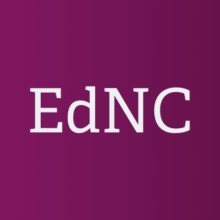Today, the National Council on Teacher Quality (NCTQ) releases its latest ratings for traditional graduate and alternative route programs preparing either elementary or secondary teachers, including 18 traditional graduate programs and four alternative route programs based in North Carolina.
Teacher Prep Review results for North Carolina
Highest ranked elementary programs (national percentile out of 194 programs):
- Greensboro College (94th)
- North Carolina State University at Raleigh (60th)
- University of North Carolina at Charlotte (58th)
- East Carolina University (56th)
Highest ranked secondary programs (national percentile out of 406 programs):
- University of North Carolina at Chapel Hill (89th)
- Fayetteville State University (69th)
- Wake Forest University (60th)
Programs earn top marks for having strong admission criteria and providing candidates with both the content knowledge and instructional techniques needed to enter the classroom ready to teach. The best programs do more to instill classroom management skills and systematically provide high-quality practice opportunities.
The full list of North Carolina’s graduate and alternative route programs can be found here.
Key Findings
— Programs’ preparation of elementary teachers is uneven.
- Of the six programs reviewed in North Carolina, both Greensboro College and the University of North Carolina at Charlotte (33 percent of programs) were found to provide basic instruction in how to teach young children to read. In the national sample, 23 percent do so.
- Not a single elementary program reviewed attends to the specific math content elementary teachers need, under the mistaken impression that elementary mathematics does not require specialized coursework. Nationally, 1 percent provide such content.
- Programs either presume or discount the importance of subject matter knowledge in science and social studies, as not a single North Carolina program adequately screens elementary candidates for content knowledge in these subjects, while 18 percent do so nationally.
— High school preparation is mixed. Compared to other states, North Carolina is better in some ways and worse in others.
- Programs struggle to ensure high school teachers are adequately screened or complete additional coursework in their subject area. Nationally, many states and programs fail to address the need for science and social studies teachers to know multiple subjects, and North Carolina is no exception. Out of the 15 programs reviewed, only Fayetteville State University and North Carolina A&T State University (representing just 13 percent of programs statewide) ensure candidates possess adequate content knowledge in both the sciences and social studies, while 36 percent of programs do so nationally.
- All high school teachers should take a course in the best ways to teach a specific subject. With 82 percent of programs requiring such coursework, North Carolina exceeds the national rate of 70 percent.
— With all the emphasis on providing teacher candidates with more and better practice, none of the North Carolina programs in the sample (the national average is 6 percent) pay sufficient attention to basic indicators of quality such as the teaching skills of the classroom mentor and providing regular observations and feedback to each novice. The need to build classroom management skills is also overlooked, and only 7 percent of programs (the national rate is 15 percent) adequately verify the classroom management skills of novices.
A full analysis of the findings can be found here.
Recommendations: Based on these findings, programs need to take several essential steps to provide stronger training to aspiring teacher.
- Focus relentlessly on the need for future elementary teachers to be ready to teach reading and math, the two most important aspects of their job.
- Prescreen applicants to make sure they already know the core content they will teach — or be prepared to prescribe the necessary remediation.
- Programs should better use student teaching and internships as an opportunity to give constructive, targeted feedback in specific classroom management strategies which are universally found to be effective.
“By better aligning teacher preparation with the real demands of teaching, North Carolina’s teacher prep programs could play a major role in boosting the quality of new teachers in the state and boosting learning in schools. What a privilege and opportunity this represents,” commented Kate Walsh, president of the National Council on Teacher Quality. “As the new NAEP results suggest, the status quo in training teachers is simply insufficient for our students’ needs.”
To schedule an interview with Rob Rickenbrode, Senior Managing Director of Teacher Prep Strategies, please contact Eric Duncan at eduncan@nctq.org or (202) 393-0020 ext. 130.
About the National Council on Teacher Quality:
The National Council on Teacher Quality (NCTQ) is a nonpartisan research and policy group, committed to modernizing the teaching profession and based on the belief that all children deserve effective teachers. NCTQ is the nation’s expert on the quality of teacher preparation programs and evaluates national teacher education against evidence-based criteria . More information about NCTQ can be found on our website, www.nctq.org


